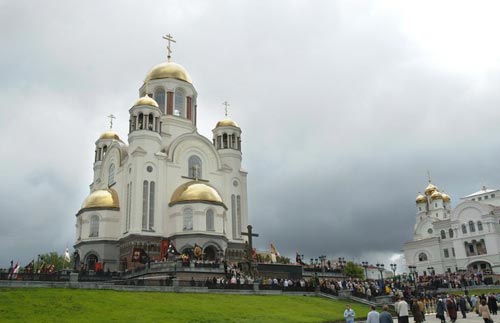City Breaks: Forget the new Cold War, we're all off to Russia
Relations may be frosty, but British tourist numbers are booming, says Mark Rowe

Your support helps us to tell the story
From reproductive rights to climate change to Big Tech, The Independent is on the ground when the story is developing. Whether it's investigating the financials of Elon Musk's pro-Trump PAC or producing our latest documentary, 'The A Word', which shines a light on the American women fighting for reproductive rights, we know how important it is to parse out the facts from the messaging.
At such a critical moment in US history, we need reporters on the ground. Your donation allows us to keep sending journalists to speak to both sides of the story.
The Independent is trusted by Americans across the entire political spectrum. And unlike many other quality news outlets, we choose not to lock Americans out of our reporting and analysis with paywalls. We believe quality journalism should be available to everyone, paid for by those who can afford it.
Your support makes all the difference.The black gold flowing from Russia's oilfields has led to an influx of newly wealthy Russians exploring London's property options. But the travel is not all one way. Russia's re-emergence as a superpower has led to the biggest increase in tourism to the country since the Gorbachev era of perestroika in the 1980s.
In the past few months the number of flight options to Russia has dramatically increased, and this has coincided with a significant relaxation in the state's visa regulations. As a result, tourists can now more easily visit some of Russia's provincial cities. Regent Holidays, which has been operating to Russia and the former Soviet Union since 1980, has noticed the shift in interest, with bookings increasing by 300 per cent since the 1980s.
"Back in the 1980s China was our top destination, but for the 2000s Russia has dominated," says Alison White, the company's tours and marketing executive. "Russia remains popular, regardless of political differences both within Russia and between Russia and the UK, though the nature of the kind of traveller has changed significantly, with individual and tailor-made travel the most popular choices."
A major catalyst was the launch, in June 2007, of the Russian airline KD Avia, based in the Russian province of Kaliningrad Oblast on the Baltic Sea. This summer KD Avia will operate daily services from Gatwick to its base in Kaliningrad, formerly Konigsberg until 1946. The airline has connections to Moscow and St Petersburg, along with several provincial Russian cities, including Chelyabinsk, Ufa, Nizhny Novgorod, Omsk, Rostov, Samara, Perm, Kazan and Volgograd.
The airline predicts that its traffic will grow to between 1.5 million and two million people per year and is banking on attracting passengers exasperated by negative experiences of Moscow's Sheremetyevo airport. Meanwhile, BMI will double the number of flights it operates to Moscow to 14 a week at the end of March.
Since October the airline has also operated a route to Ekaterinburg, the scene of the execution of Tsar Nicholas II and his family in 1918. Ekaterinburg is in the middle of the Urals, one of the geographical borders between Europe and Asia. Apart from a notoriety associated with the Tsar's execution, it has a striking cathedral and several museums.
However, Neil Taylor, a veteran tour operator to Russia and author of a number of books on the former Soviet Union, feels that a number of barriers need to be dismantled before mass tourism to the Russian provinces takes off. "These places are intrinsically interesting but they require a lot of work to visit for the typical traveller," he said. "A thousand pounds can get you a holiday in the US, Thailand or Australia, places where operators and the countries do a lot of promotion. Russia does no promotion whatsoever.
"There's no concession to tourism. A visitor to Kaliningrad or other cities has to accept the motto of 'take us as we are'. Tourism boomed in the late 1980s because we all adored Gorbachev, but today the political coverage of Russia is quite hostile. If you do not speak a smattering of Russian, or can't at least read Cyrillic, you will soon be lost – even if you go slightly off the beaten track in St Petersburg. You can get around South America without speaking Spanish but the same principle doesn't apply in Russia."
For travellers still determined to visit Russia, Mr Taylor suggests they start with the city of Kaliningrad. "Visas can be bought on arrival at the airport, and the place provides a glimpse of Russia and what other provincial towns would offer," he said. "You can get international food there and wander into cafés and restaurants – things that were just difficult or inappropriate to do during Soviet days."
Join our commenting forum
Join thought-provoking conversations, follow other Independent readers and see their replies
Comments